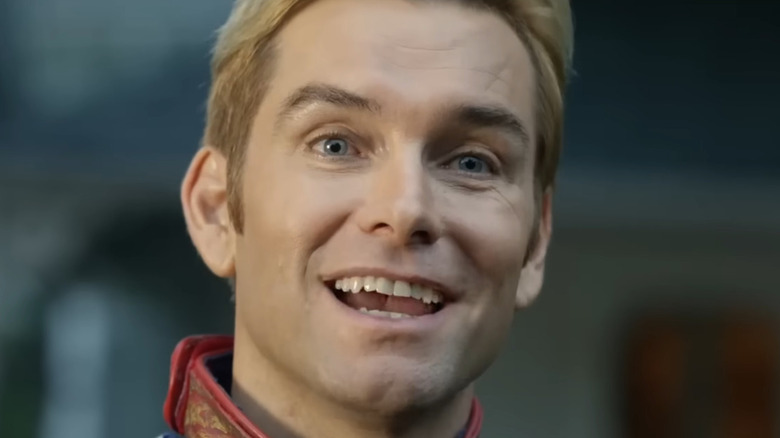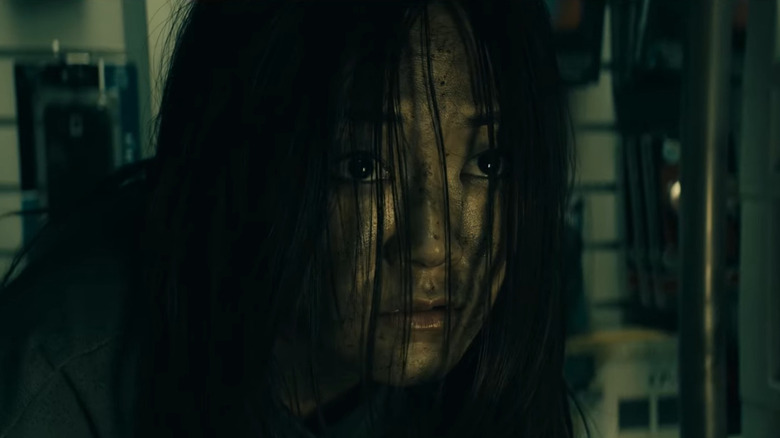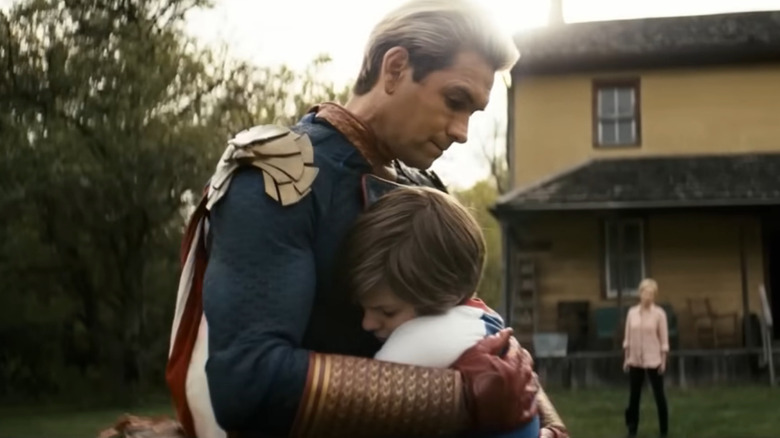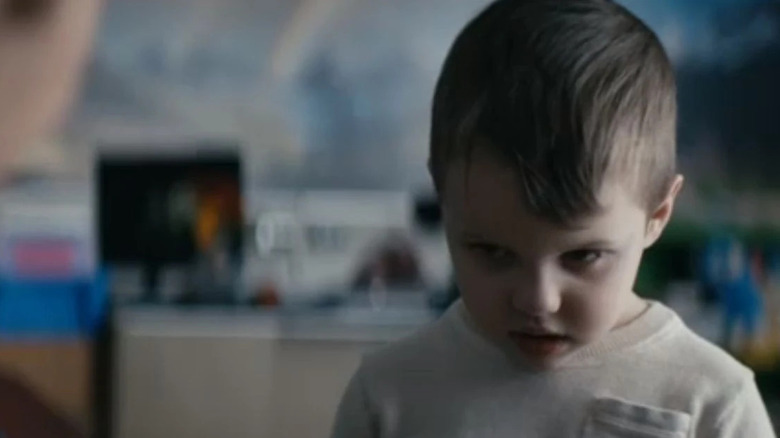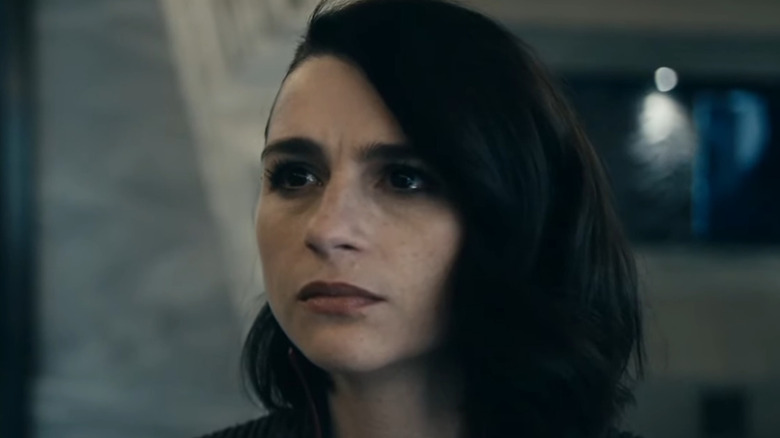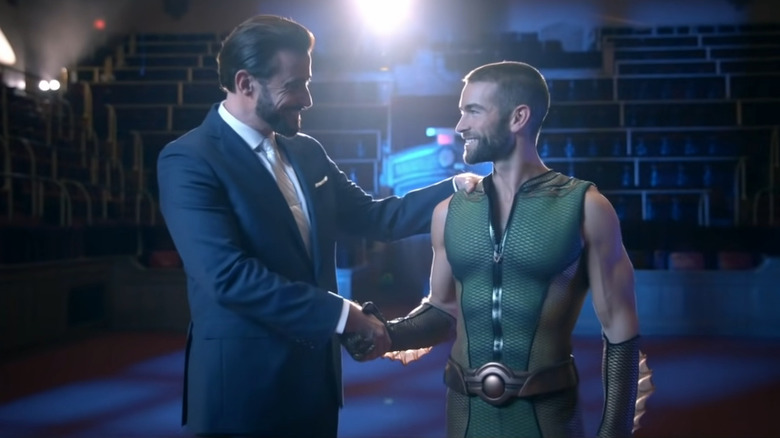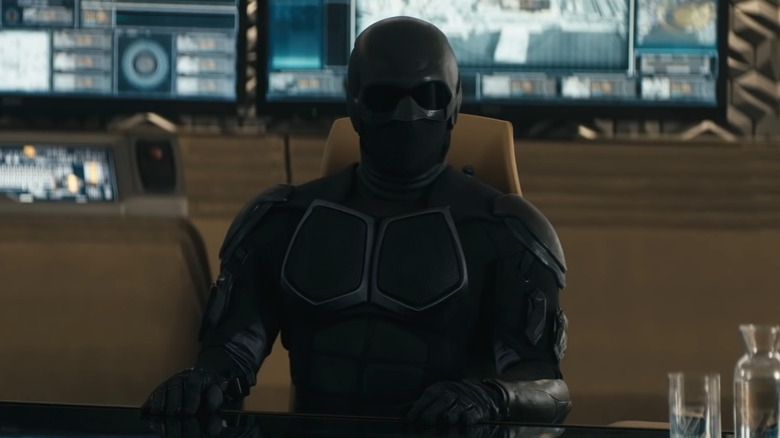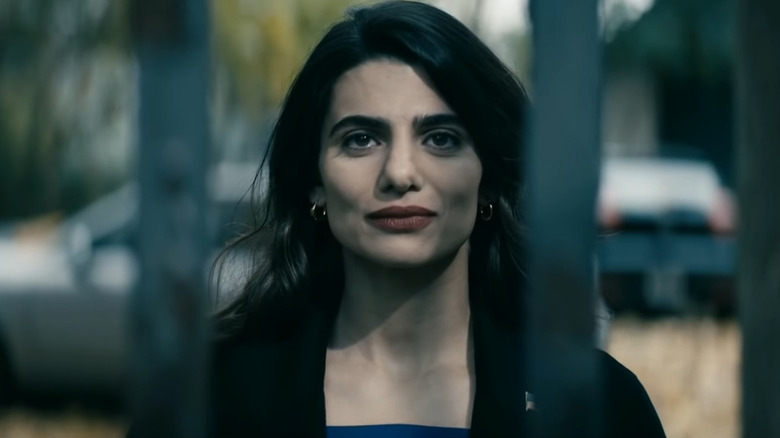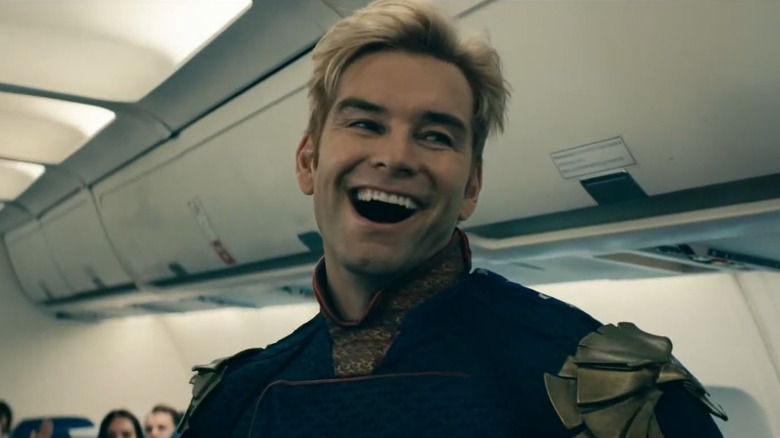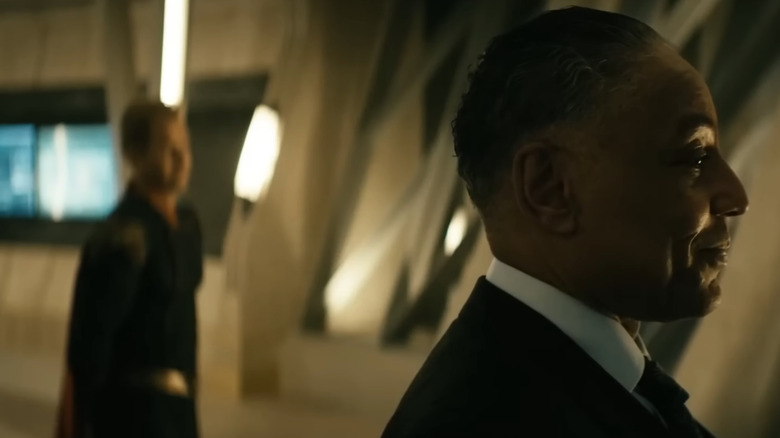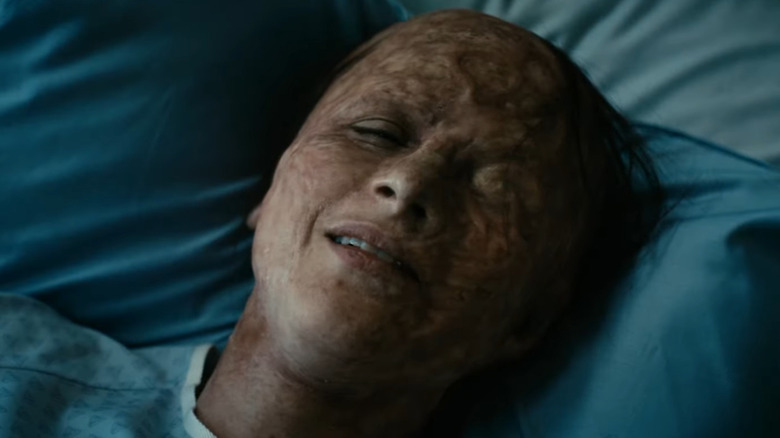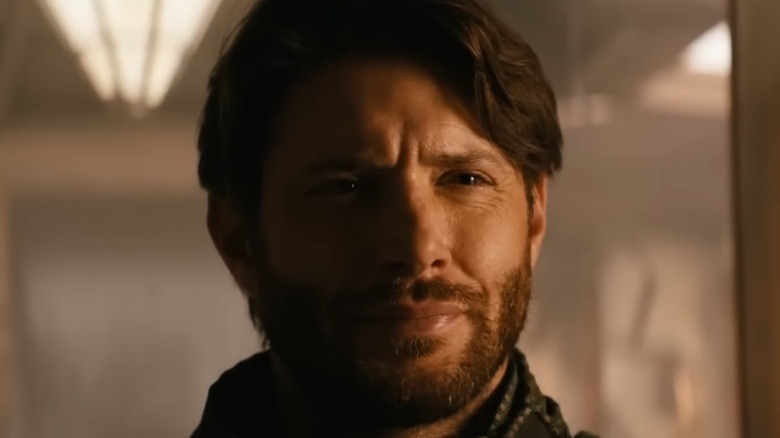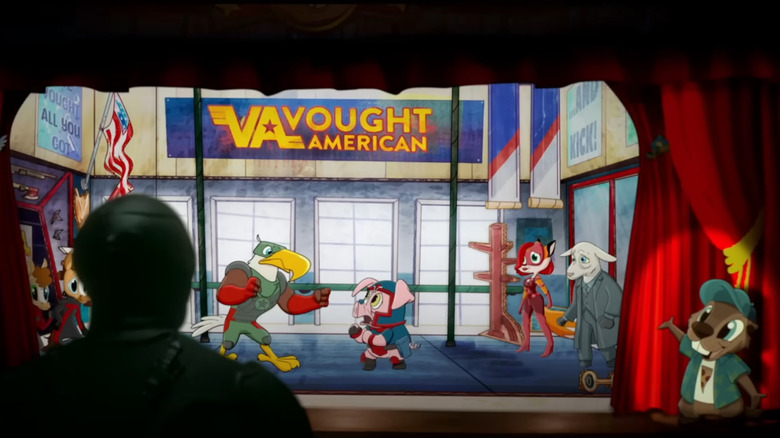The Most Confusing Moments In The Boys Explained
Amazon Prime's "The Boys" is one of the bloodiest, raunchiest superhero stories out there. The show tries to present a realistic world where superheroes ("supes") are just as corrupt as everyday businessmen and politicians. Everyone is in it for themselves, but The Boys are a small team of regular people dedicated to exposing supes for what they really are and controlling their destructive behavior as much as possible.
The universe of "The Boys" has a rich history that's as complex as any comic book franchise. Every character has their own backstory and set of motivations, and those combined with over a hundred years of fictional superhero mythology can make it challenging to understand everything that's going on, even for the comic book savvy who are used to stringing together small details and obscure references into a legible narrative. For when the onscreen excitement subsides and you're left wondering exactly what just happened, we've taken all of the most confusing moments in "The Boys" and explained them in detail.
Why was Kimiko a prisoner?
At the beginning of season 1, Billy Butcher (Karl Urban) wants to reassemble The Boys with some new additions like Hughie (Jack Quaid), but there's one new team member that he never saw coming.
The teams stumbles upon a secret basement hideout while tracking A-Train's (Jessie T. Usher) Compound V operation in "The Female of the Species." They think they're entering the superhero equivalent of a drug den, but what they actually find is much darker. In the basement are a number of gangsters guarding a girl in a cage. Once she's released, Kimiko (Karen Fukuhara) goes on a rampage, killing the gangsters and a handful of other people before The Boys manage to calm her down. After this, she starts becoming an official member of the team.
It's eventually revealed that Kimiko was kidnapped and used as a test subject for Vought's secret Compound V project. Kimiko was successfully infused with super strength and self-healing abilities, and she was locked in the cage to prevent her from escaping and somehow revealing what Vought was up to. It's unlikely that Vought would have ever been able to convince Kimiko to work for them, so chances are they would have continued to use her as a test subject, perhaps to push her powers to their limits. After all, if Vought found a way to kill Kimiko, they might discover a reliable way to rein in the almighty Homelander (Antony Starr) along the way.
Why didn't Vought tell Homelander about his son?
The reveal of Homelander's son at the end of "The Boys" season 1 serves as one of the show's biggest turning points. For years, Butcher had believed that Homelander killed his wife, and though the truth turns out to be more complicated and a bit darker, it still provides Butcher with the hope that he and Becca (Shantel VanSanten) can be together again. On the other hand, Homelander's discovery of his son seemingly changes his entire approach to life.
Homelander appears to genuinely feel a kind of hope and inspiration for the future when he looks at his son Ryan (Cameron Crovetti) for the first time. Throughout season 2, Homelander makes a series of misguided attempts at bonding with his son. By the end of season 3, Homelander has become entirely dedicated to the idea of being a father.
In retrospect, it might seem strange that the higher-ups at Vought lied to Homelander and hid Ryan's existence from him. Homelander's near-obsession with family and fatherhood seems like the perfect emotional leverage for Vought to use against its top superstar. However, the truth is that while people like Vought CEO Stan Edgar (Giancarlo Esposito) undoubtedly knew that Ryan would have a profound effect on Homelander, they couldn't have known exactly how that effect would play out. Putting Becca and Ryan into hiding was likely less about protecting them than it was about keeping Homelander locked into his destructive, but relatively predictable, routine.
What happened to Madelyn Stillwell's son?
Madelyn Stillwell (Elisabeth Shue) is Vought's Senior Vice President of Superhero Management. As a character, she's hard to pin down. At work, she's a corporate executive who seems at times dedicated to the company beyond anything else, but she also has an outsized influence on Homelander — a strange ability to keep him relatively in check. Outside of the office, though, Madelyn is a new mother who struggles to balance her time between caring for her son Teddy and preventing Vought's heroes from causing wanton destruction everywhere they go.
In the show's season 1 finale, Homelander murders Madelyn before taking Butcher to see Becca. Teddy is left abandoned in his mother's home, and the show really doesn't address what happens to him. Throughout all of season 2, there's no mention of Madelyn's baby, and his existence starts to feel like a plot thread that the show decided to drop.
Then some viewers noticed a small detail in "The Boys" season 3 that seems to reveal Teddy is at least alive and well. When Hughie goes to investigate the Red River Institute, an orphanage for supes, he runs into little Teddy. Now a bit grown up, Teddy has the ability to teleport, and that raises a few questions. Who is Teddy's father? How did he get his powers? The show gave no answers in season 3, but Teddy's reappearance could imply a bigger role for him in the future.
Where was Stormfront before joining The Seven?
"The Boys" fans first met Stormfront (Aya Cash) in season 2 when she became a new member of The Seven, but she has a much longer history that's tied to Vought and the existence of supes altogether.
In "The Bloody Doors Off," Stormfront reveals that nearly a hundred years ago, she was married to Frederick Vought, the company's founder, and that he gave her the first-ever successful injection of Compound V. Stormfront was a dedicated Nazi, and the outcome of World War 2 didn't change that.
In the 1970s, Stormfront continued to work as a superhero under the moniker Liberty. In the season 3 episode "Herogasm," Soldier Boy (Jensen Ackles) reveals that he and Liberty were the ones who came up with the idea for an annual superhero orgy. Not longer after Soldier Boy was betrayed by his teammates and captured by the Soviets, Liberty also disappeared from the spotlight.
It's hard to imagine that Stormfront sat around doing nothing for decades until Vought brought her into The Seven, but whatever work she did for the company was quiet and kept her out of the public eye. Vought wanted to keep Stormfront's apparent immortality a secret, so it made sense to have her vanish for multiple decades. Considering her intensely racist views, it's also possible Vought was trying to lessen her influence on the company overall.
Why did the Church of the Collective recruit The Deep?
The Church of the Collective is a bizarre religious group in the world of "The Boys" that first gets introduced in season 2. The church attempts to recruit The Deep (Chace Crawford) into its fold by repeatedly inviting him for deep conversations over a few Frescas — a tactic that is both utterly baffling and apparently effective.
Some have compared the Church of the Collective to scientology, and there are some definite similarities between the two. "The Boys" doesn't reveal much about the Church of the Collective's specific beliefs (beyond their worship of an alien species called the Space Spores, that is), but the group's commitment to recruitment and digging up dirt on its own members is made readily apparent.
Church leader Alastair Adana (Goran Visnjic) made it his own personal goal to get The Deep to join. It's likely that Adana had wanted one of Vought's major superheroes to become a member of the church for a long time, but The Deep's fall from grace in season 1 put him in a perfect position to be recruited. Unfortunately, we may never learn if there was a larger plan surrounding The Deep's church membership. Victoria Neuman (Claudia Doumit) murdered Alastair in the season 2 finale, leaving the organization in disarray. The church did more-or-less arrange The Deep's marriage to Cassandra Schwartz (Katy Breier), but even though she makes frequent appearances throughout season 3, the church itself is mostly absent.
How did Black Noir survive after season 2?
Near the end of season 2, Starlight (Erin Moriarty) has a dramatic battle with Black Noir (Nathan Mitchell). Starlight quickly realizes she's no match for him, but Maeve (Dominique McElligott) steps in to save the day. It turns out that Black Noir has a severe tree nut allergy, and when Maeve forces an Almond Joy into his mouth, he collapses to the ground and desperately tries to reach an epipen that Maeve kicks away. He appears to be on the verge of death when the scene cuts away, but at the beginning of season 3, he's back in the saddle like nothing happened.
"The Boys" creates a superpowered world that feels a little more grounded in reality than something like the Marvel Cinematic Universe, but occasionally, the show is just as willing to play fast and loose with the rules of its powers as any other superhero franchise. Because of that, the full scope and specifics of how Black Noir's regenerative abilities work are never really clear.
After his nut allergy flares up, Black Noir appears to go into anaphylactic shock. Black Noir is briefly comatose, but his powers start up and launch him into recovery offscreen sometime between seasons 2 and 3. This may just be an example of writer's discretion saving a character's life. Black Noir had a role to play in season 3's plot, so his allergy became more of a temporary setback than a true weakness.
Why did Victoria Neumen kill Alastair Adana?
Threaded throughout season 2 of "The Boys" is the mystery of the head-popping supe. Someone was taking out their enemies from a distance in one of the most dramatic ways possible, and the final few moments of the season revealed that person's identity when Victoria Neuman blew off Alastair Adana's head.
Alastair called Victoria to bargain with her as the new head of the Office of Supe Affairs. Their conversation clued the audience into the fact that Alastair had given Victoria compromising information about Stormfront, and he told her he would be willing to turn over dirt on plenty more supes if she helped the Church of the Collective gain a tax exemption. Instead of playing along, Victoria killed Alastair while staring through his office window.
Season 3 didn't delve any further into Victoria's former relationship with Alastair and the Church of the Collective, but what it revealed about Neuman herself can clue us into why she murdered the church's leader. As the adopted daughter of Stan Edgar, VIctoria has a much closer relationship to Vought than she's willing to publicly acknowledge. She almost single-handedly destroys her father's position at the company, and that might be exactly why she killed Alastair. Whatever Victoria is planning, it's clear she wants to be the one holding all the cards, and letting a powerful leader with insider knowledge of supes continue to act freely wouldn't help her in that regard.
Why did Homelander stop caring about being blackmailed?
Throughout "The Boys," there are countless characters struggling to defend themselves from Homelander's worst impulses and to prevent him from unleashing the full force of his powers on the general population. In season 2, Maeve manages to keep Homelander in check by blackmailing him with a video that shows he let a plane full of people crash into the ocean after threatening everyone aboard it. Knowing that his reputation would be permanently ruined if the public knew what kind of "hero" he really is, Homelander backed down like Maeve asked.
Heading into season 3, we were worried about Maeve and whether or not her blackmail would hold up. Homelander's attitude to the video seemed to have entirely changed between seasons 2 and 3. He doesn't just tell Maeve that he's no longer worried about her blackmail; he actually has Black Noir kidnap her on his behalf.
It's unlikely that Homelander really has no concerns about the plane video leaking. Instead, this is another sign that he's inching closer to a total breaking point. Showrunner Eric Kripke told TV Line that he thinks years of disagreements and fights between Maeve and Homelander have brought them to this point. However, judging by the ending of season 3, maybe Homelander really doesn't need to fear people seeing Maeve's video.
Was Stan Edgar really not afraid of Homelander?
Season 3 of "The Boys" sees Stan Edgar ousted from his role as Vought CEO by his own daughter. Victoria Neuman collaborates with Homelander to bring Vought's corporate structure to its knees, and in the end, Homelander himself becomes the head of the company. As the dust is still settling from the shake up, Homelander and Stan have a confrontation that proves which of them is really the most badass character in "The Boys."
This isn't the first time that Stan has shown he isn't afraid of Homelander, but it is the first time he's faced down the supe without being backed up by Vought's overwhelming power. Homelander could easily kill Stan without consequence, but that fact doesn't even make the former CEO flinch. Stan has clearly made peace with the fact that someday he'll die, so when it comes to his fearlessness, it might be best to take him at his word. He just doesn't respect Homelander enough to be affected by him in the slightest.
Why did Stormfront die?
Stormfront's powers made her nearly immortal and allowed her to live an unnaturally long life. She lived for more than a hundred years, and throughout that time, she adopted a number of different identities to continue pursuing her goals. Unfortunately, what Stormfront wanted more than anything in the world was to create a master race and lead a Nazi revival in the 21st century.
No one was sad to see her go, but Stormfront's sudden death in the season 3 episode "The Only Man in the Sky" still came as a somewhat confusing surprise. After Ryan nearly destroyed her in the season 2 finale, Stormfront was severely injured and confined to her bed, but at the same time, her powers were keeping her alive and would likely have returned her to full strength at some point in the future.
Stormfront's decision to end her life was less about her current condition, and more about her realizing that her ultimate goal would never be achieved. Homelander repeatedly rejected her Nazi ideals, and Stormfront got to see that rejection day after day on TV. She knew that without his help, her evil plans had no chance for success, and with no hope left for shaping the world as she saw fit, Stormfront decided to end things.
Why did Payback betray Soldier Boy?
At the beginning of season 3, Butcher and the rest of The Boys are searching for a weapon they believe the Soviets used to kill Soldier Boy decades ago. What they discover instead is that the Soviets captured Soldier Boy and have been experimenting on him ever since. It's not easy to kidnap the world's most powerful supe — and it never would have been possible if Soldier Boy's own team hadn't betrayed him.
Soldier Boy was the leader of the superhero team Payback, which also included Crimson Countess (Laurie Holden), Gunpowder (Gattlin Griffith), Mindstorm (Ryan Blakely), Swatto (Joel Labelle), the TNT Twins (Jack Doolan & Kristin Booth), and Black Noir. Much like Homelander and The Seven, Soldier Boy and Payback had a tense relationship at best. Soldier Boy was emotionally and physically abusive to all his teammates, and years of mistreatment finally pushed them over the edge. Fans of the show have debated whether or not Payback's betrayal was entirely justified, but just like when certain members of The Seven betray Homelander, it's easy to see why they made their decision.
Why does Black Noir see cartoon characters?
Black Noir has been a mysterious figure since the very first season of "The Boys." He's repeatedly shown that he's a diehard Vought loyalist who's willing to do some of Homelander's dirty work. He's also completely silent, so discerning his true feelings and motivations is a significant challenge.
Season 3 reveals some of Black Noir's backstory, and also sheds light on the way he envisions the world. In particular, he sees it populated by a legion of cute cartoon animals. Black Noir's distorted view on life is the result of brain damage he suffered when he was a member of Payback. Black Noir's healing abilities seem to leave some things by the wayside — and apparently, brain injuries are just a little bit out of their reach.
Of course, there's also a behind-the-scenes reason for Black Noir's funny cartoon friends. In an interview with TV Line, showrunner Eric Kripke explained that he didn't want to rely strictly on flashbacks to tell Black Noir's story. He said he loved the idea of inserting cartoons into the show because, "If there's an idiosyncratic way that I can tell a story, I'll take it because it's way more fun to step out of the box and tell something uniquely." Black Noir's story is certainly unique, and we can only hope his healing abilities will allow him to come back for future episodes.
